MercoPress. South Atlantic News Agency
Tag: Nicolas Dujovne
-
Thursday, September 27th 2018 - 05:45 UTC
IMF and Argentina concord on 36-month US$ 57bn stand-by agreement
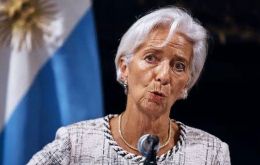
The International Monetary Fund staff and Argentina authorities have reached an agreement on a set of strengthened economic policies that will underpin the 36-month Stand-By Arrangement (SBA) approved on June 20, 2018.
-
Tuesday, September 25th 2018 - 21:35 UTC
Who is Guido Sandleris, Argentina's Central Bank president after the surprise resignation of Caputo
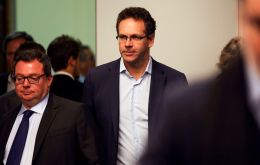
The resignation of Luis Caputo to the Presidency of the Central Bank of Argentina (BCRA), which has been reflected with surprise by the international media, occurs amid the trip of the Argentine President, Mauricio Macri, to New York to attend the Assembly General of the UN and with the mission of restoring the confidence of the international market in the Argentine economy. His predecessor, Guido Sandleris, receives a Central Bank when it is about to close an agreement with the International Monetary Fund (IMF).
-
Tuesday, September 25th 2018 - 19:04 UTC
Argentine Central bank governor resigns for personal reasons: Peso slides 5% against the US dollar
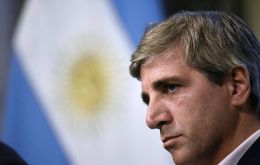
The governor of Argentina's central bank, Luis Caputo resigned on Tuesday for personal reasons, the bank said in a statement, a surprise announcement in the midst of the country's talks with the IMF that sent the peso tumbling. Former finance minister Caputo has only held the role since June and is the second Argentine central bank president to resign this year. Argentina's peso currency slid 4.65% to open at 39.15 per U.S. dollar after the announcement, traders said.
-
Friday, September 21st 2018 - 08:31 UTC
Argentina/IMF making “important progress” on reforms for loan package, but no specific timeline

Argentina's budget proposal submitted this week is a key element in the reforms needed for a new loan package for the crisis-hit country, an International Monetary Fund spokesman said Thursday.
-
Thursday, September 20th 2018 - 06:50 UTC
Argentina's economy contracts 4.2% in second quarter: severe drought blamed

Argentina's economy contracted sharply in the second quarter after a severe drought roiled agricultural production and as the country works with the International Monetary Fund to stem spiraling inflation and control government finances.
-
Wednesday, September 19th 2018 - 09:05 UTC
Argentine Peso slid on Tuesday but the Merval stock market climbed a strong 3%
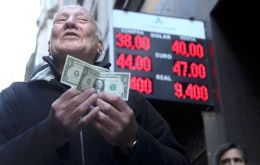
Argentina’s central bank sold US$ 261 million in reserves on Tuesday, the monetary authority said in a statement announcing its latest intervention in the foreign exchange market aimed at easing the fall of the local currency.
-
Thursday, September 13th 2018 - 10:34 UTC
Argentine labor unions and social groups protest austerity measures in Buenos Aires City
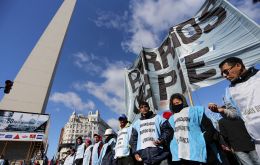
Labor unions and social groups blocked streets in downtown Buenos Aires on Wednesday, with more marches planned over the days ahead over austerity measures proposed by the government and backed by the International Monetary Fund. Protesters are angry about the belt-tightening policies, which are cutting services to low-income Argentines already walloped by inflation of 31 percent and climbing.
-
Wednesday, September 12th 2018 - 08:55 UTC
Argentina's central bank keeps key interest rate at 60%
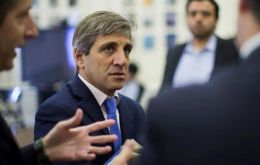
Argentina's central bank kept its key interest rate on Wednesday at 60%, one of the highest in the world, following a surprise hike two weeks ago after the peso plunged. Central bank officials said in a statement that inflation accelerated in August and continues to do so September, citing high-frequency data.
-
Thursday, September 6th 2018 - 08:40 UTC
IMF receptive to Argentina's request, but now Macri must implement the hard austerity program
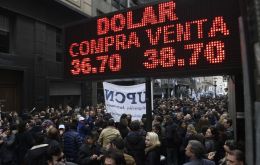
Argentina’s economy minister sounded upbeat on Wednesday about clinching a new deal with the International Monetary Fund after two days of talks in Washington, and said had sought U.S. support for securing approval from the IMF’s board.
-
Wednesday, September 5th 2018 - 08:16 UTC
Argentine Peso slid another 2.18% and the Central bank sold US$ 350 million in reserves
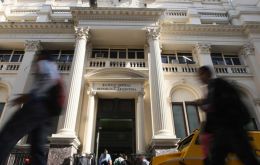
Argentina’s peso slid further on Tuesday as investors reacted with skepticism to president Mauricio Macri’s plans. Many worry he will not be able to push reforms through a restive Congress amid growing frustration on the streets of Buenos Aires.
